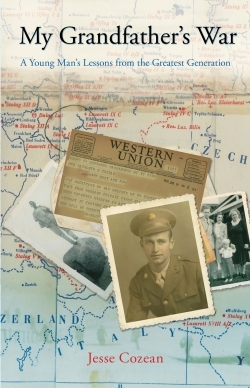My Grandfather's War
A Young Man's Lessons from the Greatest Generation
When a parent or grandparent dies, there’s often a residual feeling of regret. “Why didn’t I take time to ask more about her life?” or, “I should’ve listened more carefully to Dad’s stories.” Jesse Cozean doesn’t have to deal with these sentiments. In his memoir, Cozean tells what he learned about his grandfather Robert Cozean’s time in a prison camp in World War II and shows how their relationship developed as the older Cozean approached death.
Robert Cozean began talking about his prison camp experiences when he was eighty years old. It wasn’t until seven years later that his grandson truly began to listen. What he heard was a heart- wrenching story: from ambush at the Battle of the Bulge to surviving a bombing while locked in a crowded boxcar to facing starvation and arctic weather at gunpoint in Stalag IBX in northern Germany.
Jesse had heard the stories before, but for some reason this time they took root. Jesse’s memoir presents the parallel stories his grandfather’s war and his own journey toward a deeper appreciation. The stories weave together smoothly, creating a narrative of survival and growth and showing the depths of familial and generational identity.
The story escalates as Robert is diagnosed with a faulty heart valve. Readers feel Jesse’s growing sense of urgency and inadequacy as he asks his grandfather about subjects like what it’s like to see a friend machine-gunned down and what it feels like to starve. At the end of the main interview, Robert’s own question resonates with readers as it did with Jesse: “Do you think you would’ve survived?”
Jesse Cozean’s confident voice toes the line between nostalgia and history and steeps every page in respect. His humor and cynicism capture the voice of his generation, filling the story with playful details of the two men and their relationship.
The illuminating back matter includes Robert’s staccato diary from his time in the camp (“Jan. 11 ‘Soup—like water’; Jan 15. ‘Still awful cold’; Apr. 2 ‘Tanks came—we are free, potato soup, time to eat again’”), a military intelligence report about the study and liberation of Stalag IBX, and the Red Cross report detailing the conditions rescuers found in the camp.
This compelling memoir will resonate with Millennials, aging veterans, and the generations trapped between.
Reviewed by
Melissa Anne Wuske
Disclosure: This article is not an endorsement, but a review. The publisher of this book provided free copies of the book and paid a small fee to have their book reviewed by a professional reviewer. Foreword Reviews and Clarion Reviews make no guarantee that the publisher will receive a positive review. Foreword Magazine, Inc. is disclosing this in accordance with the Federal Trade Commission’s 16 CFR, Part 255.

